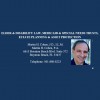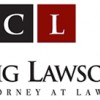
My practice is limited to counseling individuals and their families on matters involving Florida Elder & Disability Law, Medicaid & Special Needs Trusts, Estate Planning & Asset Protection. I provide my clients with the legal tools available for the management of their assets in the event of disability and for passing their estate upon death to their chosen beneficiaries with as little expense as possible.
Often this involves a review of my client's current estate planning documents, as well as the beneficiary designations on insurance products and IRA accounts. Sometimes the estate plan will lead to Revocable Trusts or Joint Revocable Trusts. Depending upon the size of their estates, I show my clients how to minimize income taxes, estate and gift taxes, and how to provide asset protection for their children and other beneficiaries.
In most cases, the estate plan will require an updated Durable Power of Attorney, Designation of Health Care Surrogate, Living Will, and Declaration of Preneed Guardian.
Often this involves a review of my client's current estate planning documents, as well as the beneficiary designations on insurance products and IRA accounts. Sometimes the estate plan will lead to Revocable Trusts or Joint Revocable Trusts. Depending upon the size of their estates, I show my clients how to minimize income taxes, estate and gift taxes, and how to provide asset protection for their children and other beneficiaries.
In most cases, the estate plan will require an updated Durable Power of Attorney, Designation of Health Care Surrogate, Living Will, and Declaration of Preneed Guardian.
Services
This web site is designed for general information only.
The information presented at this site should not be construed to be formal legal advice nor the formation of a lawyer-client relationship.
Persons accessing this site are encouraged to seek independent counsel for advice regarding their individual legal issues.
The information presented at this site should not be construed to be formal legal advice nor the formation of a lawyer-client relationship.
Persons accessing this site are encouraged to seek independent counsel for advice regarding their individual legal issues.
The joint revocable living trust ("JRT") is a special type of revocable living trust that is created by two people ("grantors").
They may be you and your spouse, significant other, a brother or sister or any two people who may have an interest in pooling their assets for estate planning purposes.
For purposes of this article, I will often refer to the grantors as a "couple" and often assume that the couple is married.
However, JRT's work equally well for unmarried persons.
You and your spouse may also be the initial trustees during your lifetimes.
They may be you and your spouse, significant other, a brother or sister or any two people who may have an interest in pooling their assets for estate planning purposes.
For purposes of this article, I will often refer to the grantors as a "couple" and often assume that the couple is married.
However, JRT's work equally well for unmarried persons.
You and your spouse may also be the initial trustees during your lifetimes.
For years the public has heard stories about the "horrors of probate" and the "cure-all" known as the Revocable Living Trust.
Clients frequently want my opinion as to whether a trust would be suitable for them.
Unfortunately, they are usually pre-sold on the idea of creating a living trust by people who have a vested interest in "selling trusts."
When it is appropriate for the client, I completely support the use of a revocable living trust in an estate plan.
However, I do not believe that you should get involved in creating a revocable living trust unless you understand the basics of what it can and cannot do for you.
Clients frequently want my opinion as to whether a trust would be suitable for them.
Unfortunately, they are usually pre-sold on the idea of creating a living trust by people who have a vested interest in "selling trusts."
When it is appropriate for the client, I completely support the use of a revocable living trust in an estate plan.
However, I do not believe that you should get involved in creating a revocable living trust unless you understand the basics of what it can and cannot do for you.
The prospect of becoming incompetent and no longer able to make decisions and care for one's self is extremely troubling.
Yet, most people focus on planning for the distribution of their assets on death rather than planning for long-term incapacity.
As you may have already observed, long-term incapacity can be even more devastating than death, both emotionally and financially.
An essential tool for dealing with incapacity is the Durable Power of Attorney (also referred to in this article as "DPOA").
Yet, most people focus on planning for the distribution of their assets on death rather than planning for long-term incapacity.
As you may have already observed, long-term incapacity can be even more devastating than death, both emotionally and financially.
An essential tool for dealing with incapacity is the Durable Power of Attorney (also referred to in this article as "DPOA").
My clients frequently ask me, "How can I help my disabled child (or grandchild) after I am gone?"
They often know that if the disabled individual receives an inheritance, he may lose Medicaid or SSI (Supplemental Security Income) benefits.
1. Disinheriting the disabled individual (and hoping that the individual's brother or sister will use a portion of the inheritance for the care of the disabled sibling).
This will protect against the loss of public benefits, but how will the client know that any care will be provided to the disabled loved one?
They often know that if the disabled individual receives an inheritance, he may lose Medicaid or SSI (Supplemental Security Income) benefits.
1. Disinheriting the disabled individual (and hoping that the individual's brother or sister will use a portion of the inheritance for the care of the disabled sibling).
This will protect against the loss of public benefits, but how will the client know that any care will be provided to the disabled loved one?
Reviews

Be the first to review Law Office Of Martin H Cohen.
Write a Review
